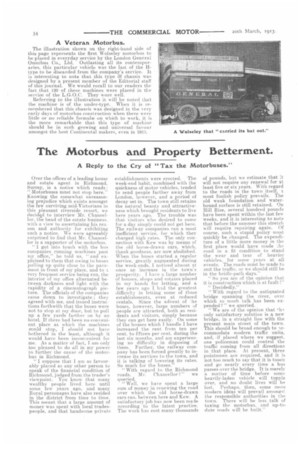The Motorbus and Property Betterment.
Page 12

If you've noticed an error in this article please click here to report it so we can fix it.
A Reply to the Cry of "Tax the Motorbuses."
Over the offices of a leading house and estate agent in Richmond. Surrey, is a notice which reads : "Motorbuses must not stop here." Knowing the somewhat unreasoning prejudice which exists amongst the few surviving mid-Victorians in this pleasant riverside resort, we decidcd to interview Mr. Chancellor, the head of the estate business. with a view to ascertaining his rest son and authority for exhibiting such a notice. We were agreeably surprised to find that Mr. Chancellor is a supporter of the motorbus.
"1 got into touch with the bus companies running machines past my office," he told us, "and explained to them that owing to buses pulling up quite close to the pavement in front of my place, and to a very frequent service being run, the interior of my office alternated between darkness and light with the rapidity of a cinematograph picture. The officials of the companies came down to investigate ; they agreed with me, and issued instructions forthwith that the buses were not to stop at my door, but to pull up a few yasais farther on by an hotel, If there had been no convenient place at which the machines could stop, I should not have
bothered in the least, although it would have been ineonvenient for
me. As a matter of fact, T EMI only too pleased to do all in my power to further the cause of the motorbus in Richmond.
" I suppose that I am as favour
ably placed as any other person to speak of the financial condition of
Richmond, judged from the trader's viewpoint. You know that many wealthy people lived here until some few years ago, and many Royal personages have also resided in the district from time to time.
This meant that a large amount of money was spent with local tradespeople, and that handsome private
establishments were erected. The week-end habit, combined with the quickness of motor vehicles, tended to send people farther away from London, however, and a period of decay set in. The town still retains the natural beauty and attractiveness which brought residents to live here years ago. The trouble was that visitors who desired to come for a day simply could not get here. The railway companies ran a most inefficient service, for which they charged high rates. The only connection with Kew was by means of the old horse-drawn cars, which, thank goodness, are now abolished. When the buses started a regular service, greatly augmented during the week-ends, I noticed almost at once an increase in the town's prosperity. I have a large number of houses, shops and estates placed in my hands for letting, and a few years ago I had the greatest 'difficulty in letting some of these establishments, even at reduced rentals. Since the advent of he buses, however, large numbers of people are attracted, both as residents and visitors, simply because they can get here easily. On some of the houses which I handle I have increased the rent from ten per cent. to fifteen per cent, during the last six months, and am experiencing no difficulty in disposing of them. Further, the railway company has been forced greatly to increase its services to the town, and it is talking of lowering its rates. So much for the buses."
"With regard to the Richmond roads, Mr. Chancellor ? " we queried. "Well, we have spent. a large sum of money in renewing the road over which the old horse-drawn cars ran, between here and Kew. A satisfactory job has now been masle according to the latest practice. The work has cost many thousands
of pounds, but we estimate that it will not require any renewal for at least five or six years. With regard to the roads in the town itself. a most foolish policy prevails. The old weak foundation and waterbound surface is still retained. On Hill Rise, several hundred pounds have been spent within the last few weeks, and it is interesting to note that before the summer this stretch will require repairing again. Of course, such a stupid policy must quickly be changed. The expenditure of a little more money in the first place would have made she road in a fit condition to stand the wear and tear of heavier vehicles, for some years at all events. The roads must be made to suit the traffic, or we should still be in the bridle-path days."
"So you are of the opinion that it is construction which is at fault ?" " Decidedly."
"With regard to the antiquated bridge spanning the river, over which so much talk has been expended'? " we queried.
"We are of the opinion that only satisfactory solution is a new bridge, in a straight line with the present main street of the town. This should be broad enough to accommodate modern traffic units, and, if placed where we suggest, one policeman could control the traffic coming from all directions in that place. At present, three pointsmen are required, and it is not too much to say that it is tonal and go nearly every time a bus passes over the bridge. It is merely a matter of time before some heavily-laden vehicle will topple over, and no doubt lives will be lost. Perhaps, then, some more modern iddas will prevail amongst the responsible authorities in the town. There will be less talk of taxing the motorbus, end up-todate roads will be built."
























